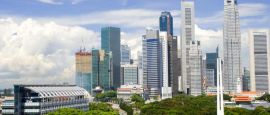Getting around Singapore
Singapore is too small for domestic flights to be useful or available. Sightseeing flights can be arranged locally through the Republic of Singapore Flying Club (www.singaporeflyingclub.com).
Singapore’s size means that getting around by car is feasible, although driving tends to be aggressive and traffic is often chaotic. This, combined with an excellent public transport network, mean that it rarely makes sense for tourists to drive in the city.
Expressways run roughly around the perimeter of the island (barring the restricted areas in the west), and also through the middle of the island from the central business district in the south to Woodlands in the north (which is the access point for the causeway to Johor Bahru in Malaysia).
There are several car hire/self-drive firms with offices at the airport and in hotels. They are expensive however, and public transport is good enough that driving offers few advantages. If you’re heading over into Malaysia, it’s cheaper to hire a car in Johor Bahru instead.
It can be hard to find an available taxi at peak times in Singapore; in the centre, they only stop at designated ranks and cannot be flagged down in the street. The pricing system is complex, but at least drivers use the meters.
Cycling on the main roads is not a very pleasant experience, due to a combination of heavy traffic and aggressive driving. Taking a ride in the main island’s various parks, many of which are linked by cycle paths, is a much better idea. Many of the parks have hire outlets.
Drive on the left, use seat belts in both the front and the back seats, and do not use mobile phones while driving. All motorists driving into the central business district or travelling on some major roads are required to pay the ERP (Electronic Road Pricing). This toll is automatically collected from an device in the car, into which a special cash card is inserted (it can be charged at petrol stations and 7-Eleven stores).
Members of the AA can apply for visiting membership of the Automobile Association of Singapore (tel: +65 6748 9911; www.aas.com.sg), which provides a 24-hour towing service. Numerous other breakdown services operate on the island.
A national driving licence is sufficient for stays up to one month. For visits beyond one month, an International Driving Permit is required.
Bus: Singapore’s bus network is extensive and efficient. The main operators are SMRT (tel: 1800 336 8900, in Singapore only; www.smrt.com.sg) and SBS (tel: 1800 225 5663, in Singapore only; www.sbstransit.com.sg). Pay with the exact change, or using an EZ-Link card or Tourist Pass. The former is pay-as-you-go, while the latter (www.thesingaporetouristpass.com.sg) offers unlimited travel for a day.
Trishaws: This traditional form of chauffeur-pedalled transport is a fun way to tour the streets of Singapore, but agree on a price before setting off.
Taxi: These are numerous and relatively cheap, although there can be a wait during peak times, late at night or when it rains. They can be picked up from outside hotels and official ranks or flagged down in the streets. Taxis are metered, but some surcharges are not shown on the meter. It is possible to negotiate hourly rates for round-island tours.
Metro: The Mass Rapid Transit (MRT) (tel: 1 800 336 8900, in Singapore only; www.smrt.com.sg) is a modern, comfortable, efficient and cheap way to explore Singapore. The MRT system extends out to Changi Airport (journey time from the City Hall interchange is just under half an hour). The metro system is supplemented by three Light Rail Transit (LRT) lines, although these are of most use to commuters.
Cable car: A cable car runs to Sentosa island from HarbourFront Tower Two, although it’s much cheaper to take a bus or just walk across the Boardwalk from VivoCity Shopping Mall.
Do you have any Feedback about this page?
© 2026 Columbus Travel Media Ltd. All rights reserved. No part of this site may be reproduced without our written permission, click here for information on Columbus Content Solutions.




 You know where
You know where
